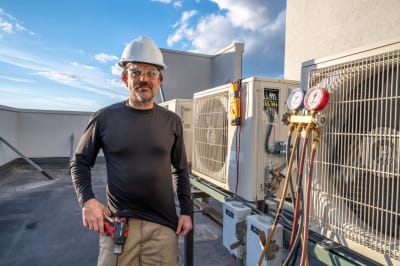Record-breaking temperatures have become a regular occurrence in recent times. Many families have had to adapt, and one of the results is an ever-growing demand for HVAC technicians in Florida.
If you would like to consider being part of a team of experts that continue to satisfy this demand, this is the best place to start. In this article, we dive into the most important details every aspiring HVAC technician in Florida must know, including the steps to take when kickstarting an HVAC career and the best training programs to consider.
We also quickly examine the certification and licensing requirements for HVAC technicians in the state, along with the potential salary and job outlook.
How to Become an HVAC Technician in Florida
Becoming an HVAC technician in Florida usually involves following the key steps below:
Step 1: Finish High School
Florida rarely specifies an absolute minimum education requirement for HVAC technicians. But it is usually a common requirement among trade schools, apprenticeships, and companies to request that candidates at least possess a high school diploma or GED equivalent.
Step 2: Acquire Training from your Institution of Choice
Training is the most important aspect of becoming an HVAC technician. For candidates in Florida, there are two main options to consider — to apply for an apprenticeship program or enroll in a trade school/college program.
- Applying for an Apprenticeship Program - The state allows certain trade unions, organizations, and companies to run apprenticeship training programs to build up upcoming HVAC technicians. These programs usually run for a few years and focus on providing real-world, hands-on training and mentorships.
- Enrolling in a Trade School Program - Trade schools and colleges in Florida have impressive HVAC technology programs wherein students are trained on foundational topics in heating, cooling, and air ventilation systems.
Unlike apprenticeship programs, formal training programs often focus on classroom training before incorporating hands-on training in the real world.
To enjoy the best of both worlds, candidates may spend time in a formal training program before enrolling in an apprenticeship.
Step 3: Apply for a Contractor License
Florida has four distinct classes of HVAC licenses. These are Class A State Certified Contractor, Class B State Certified Contractor, Class A State Registered Contractor, and Class B State Registered Contractor.
HVAC technicians must obtain at least one of these licenses before being allowed to practice professionally.
Consider Trades with Similar Paths:
Top HVAC Technician Schools in Florida
Florida Education Institute
Miami, FL Online + Campus
The Florida Education Institute offers high-quality HVAC training for future technicians. Predominantly lab-based, successful applicants of this program will enjoy a lot of hands-on training and classroom instructions.
Tuition
$16,950 - $24,599Contact
(786) 998-3465
admissions@fei.edu
Lindsey Hopkins Technical College
Miami, FL Online + Campus
Another institution emphasizing lab-based training, the Lindsey Hopkins Technical College, brings up future HVAC technicians through a 1,350-hour comprehensive training program.
Tuition
$2,304 - $9,225Contact
(305) 324-6070
graysharona@dadeschools.net
Lake Technical College
Eustis, FL Online + Campus
Lake Technical College offers a Heating, Ventilation, and Air Conditioning/refrigeration program designed to introduce students to fundamental concepts of the field. The program includes 750 hours of training that can be completed in around 25 weeks.
Tuition
$2 - $12 per Clock HourContact
(352) 589-2250
colemanb1@lake.k12.fl.us
Explore HVAC Technician Schools by City:
Licensure and Certification Requirements
As mentioned earlier, Florida has four different categories of HVAC licenses. The Class A State Certified Contractor license allows technicians to work anywhere in the state on any size unit. The Class B State Certified Contractor license allows technicians to work on 25 tons or less of cooling and 50,000 BTU of heating.
The Class A State Registered Contractor and Class B State Registered Contractor licenses allow technicians to work only in their locality.
Each of these categories has its separate examinations. Among the requirements are a high school diploma or GED, a training program certificate, experience in the industry, and passing the knowledge and business exam.
Salary and Job Outlook
The annual average salary for HVAC technicians in Florida is $49,493. The lowest earners take home an annual average salary of $31,936, while the highest earners make $76,700 per year.
The best location to be an HVAC technician in Florida is Gainesville, with an annual average salary of $52,944. Sarasota and Orlando round up the top three with annual averages of $52,779 and $51,195, respectively.
HVAC technicians in Miami take home an average salary of $48,845 per year.
Sorting strictly by experience, those with less than a year’s worth of experience earn an annual average salary of $45,869, while those with more than 10 years of experience earn around $67,041 per year.





